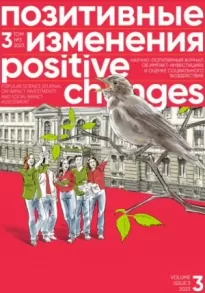Позитивные изменения. Том 3, № 3 (2023). Positive changes. Volume 3, Issue 3 (2023)

- Автор: Редакция журнала «Позитивные изменения»
- Жанр: Научная литература / Газеты и журналы
- Дата выхода: 2023
Читать книгу "Позитивные изменения. Том 3, № 3 (2023). Positive changes. Volume 3, Issue 3 (2023)"
UNIVERSITIES OF THE FUTURE: WHAT ARE THEY?
Universities in 2030 are “universities without walls,” open and engaged in society while retaining their core values. They are responsible, autonomous and free, with different institutional profiles, but united in their missions of learning and teaching, research, innovation and culture in service to society.
The authors of the strategy believe that universities will build on their capacity to evolve and will become engines of societal change. They will provide an open, transformative space for common knowledge production through research, education, innovation and culture. Together with other societal stakeholders, they will shape the future of a knowledge-driven society. Below we will take a closer look at the characteristics of the universities of the future, as outlined in the strategy.
OPEN, TRANSFORMATIVE AND TRANSNATIONAL
The strategy emphasizes that universities, as communities of learners, academics and professional staff, including alumni and a wide range of partners and citizens, will continue to build bridges between countries, cultures and sectors.
The authors of the document emphasize that universities are the places for testing new ideas, for lateral thinking and for creating new knowledge that still lies outside of mainstream awareness. The European University Association points out that universities can benefit from a dialog with society, actively involving citizens, businesses, non-governmental organizations, public authorities and others.
“Universities will be open as physical and virtual spaces and will work to cultivate both of these when engaging with society. The physical campus will continue to be crucial as a place for social interaction, meetings, dialogs, focused learning and research. The virtual campus will make the university ubiquitous. It will be developed to improve access for all to participate in research and learning, enhance cooperation, and explore new, innovative ways of pursuing university missions,” the document states.
The Association believes that the future of Europe’s universities will be transnational, continuing to provide a prerequisite for high quality research and innovation, as well as learning and teaching.
SUSTAINABLE, DIVERSE AND ENGAGED
According to the authors of the vision, universities will put their missions into the service of sustainability. This will require a careful balance between funding of strategic research priorities, retaining the freedom of the individual researchers and recognizing the responsibility of universities in ensuring a broad knowledge base for society.
Interdisciplinarity is an important approach in the universities’ activities. Many new discoveries will happen at the interface between disciplines and will be crucial for meeting the challenges.
Diversity and social cohesion are important components of sustainable development. Access to higher education will be equitable and open to all. Universities will be equipped to welcome students and staff from all backgrounds, playing an important role in addressing social disparities.
“Learning and research environments will be designed to accommodate the needs of a diverse student and staff body. Universities will keep working in partnerships in order to connect, share and build capacity. They will form an inclusive, truly global research and higher education community with partners all around the world,” the vision proclaims.
STRONG, AUTONOMOUS AND ACCOUNTABLE
The EUA believes that in 2030, universities across Europe will enjoy high levels of autonomy and have the capacity to make strategic choices about organizational, financial, staffing and academic matters. The university community, including all types of learners and staff, will co-create the future of the university together with the institutional leadership.
Universities will be accountable to stakeholders and society at large. There will be a continuous exchange with policy makers, civil society, citizens, business and other societal groups, through various university activities. Stakeholders will support such a dialogue.
The strategy endorses the idea of academic freedom, which is the freedom of thought and inquiry to advance knowledge based on accepted standards of academic ethics and integrity. Universities will ensure that all staff groups have access to continuous training for professional development.





